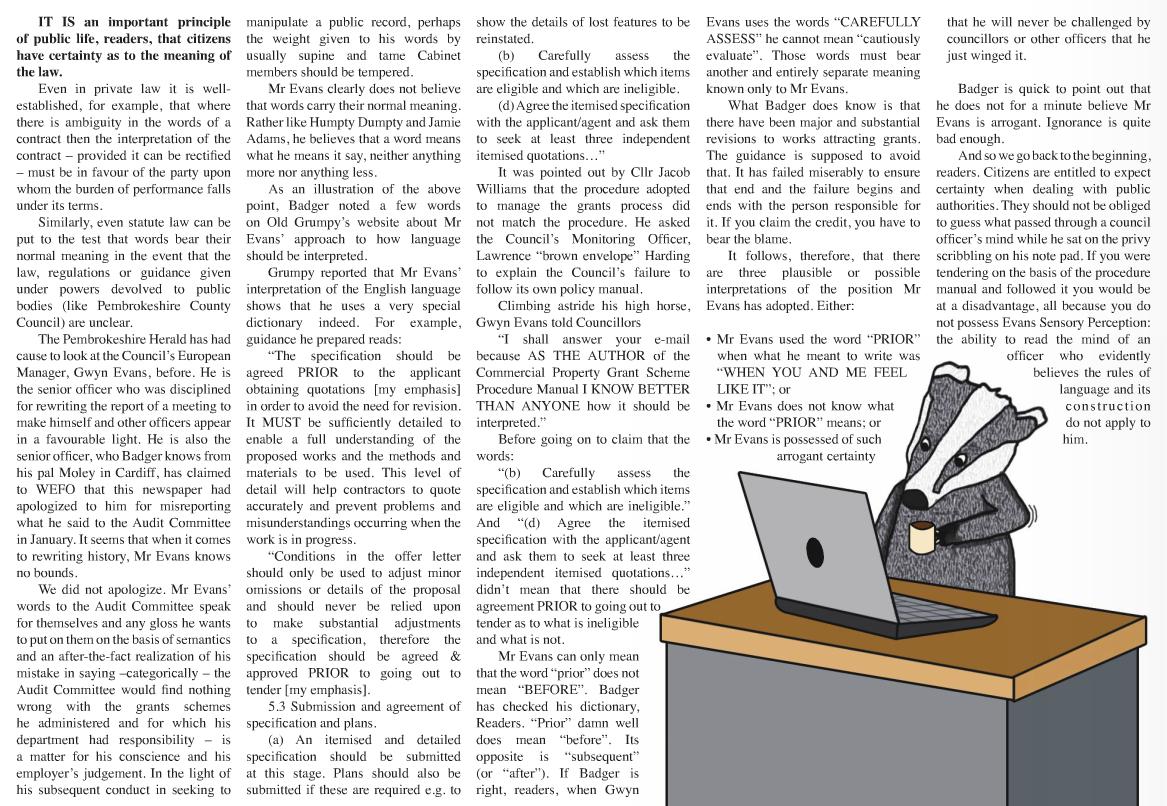News
Badger and the little Red Book

 BEFORE Badger begins, he would like to correct an impression that could have been given by his column last week that Cllr Keith Lewis had not repented of any sins. Keith repenteth plenty. Or at least he will soon. It was a case of too many Lewises spoiling the joke. Saint Simon of Neyland will forgive Badger. Saint Simon knows that one word, “Plus” (or minus), can make or ruin a joke however bad. It is Rob Lewis who repenteth not, Saint Simon. Pray for his immortal soul, pray. And after that, on with the motley and back to the fray. A long time ago, when the world was green, adherents to extremist ideology clustered around one or two publications like moths drawn to a flame.
BEFORE Badger begins, he would like to correct an impression that could have been given by his column last week that Cllr Keith Lewis had not repented of any sins. Keith repenteth plenty. Or at least he will soon. It was a case of too many Lewises spoiling the joke. Saint Simon of Neyland will forgive Badger. Saint Simon knows that one word, “Plus” (or minus), can make or ruin a joke however bad. It is Rob Lewis who repenteth not, Saint Simon. Pray for his immortal soul, pray. And after that, on with the motley and back to the fray. A long time ago, when the world was green, adherents to extremist ideology clustered around one or two publications like moths drawn to a flame.
Badger remembers the strident cries of “Socialist Worker!” delivered in a mockney dahn serf accent by Repton old boys whose daddies were something big in the FO; Badger remembers Militant, a newspaper printed and circulated by those who thought everyone had sold out Marxist-Leninism, including —rather surprisingly — the pre-Glasnost Soviet Union. Badger remembers when jokes like this were rather more common: Q: How many Marxists does it take to screw in a light bulb? A: None: The light bulb contains the seeds of its own revolution! But the touchstone of many a member of the lunatic fringe of British left wing politics was a selection of extracts from speeches and aphorisms delivered by the biggest dingbat in the Comtnunist belfry.
Badger refers of course to “Quotations of Chairman Mao Tse-Tung”; otherwise, universally known in the West as “The Little Red Book”. Now, the glorious dawn of a new Cultural Revolution is upon us with the ascent to the giddy heights, Chair of Pembrokeshire County Council, of Chairman Tom Richards. Tom, often to be seen sashaying around Quay Street in a quite fetching scarf, hat and coat combination of a style befitting a gentleman farmer, has ascended to this seat of power not because of his keen insight, still less in recognition of his administrative skill or prowess with a well-timed gavel. No: readers Chairman Tom has been promoted to glory because of the old rule of “Buggin’s ibm”. This is not so much a job for the boys, as a job for one of the “good old boys”. But here is his chance to make a mark. To exchange notoriety for fame. Perhaps, readers, Chairman Tom’s thoughts might give us an insight into the future.
His investigative instincts piqued, Badger tunnelled to the Chairman Welsh Hook fastness to try and get a peep at what makes Tom tick and to discover how the Chairman’s thought processes work. After taking a wrong turn in Cockshoot Wood, Badger espied the tower of St Lawrence’s Church and regained his bearings: guided by the clink of glass on glass to the window of Chairman Torn’s parlour. There, wearing naught but his hat, chain of office, and an enigmatic smile was Chairman Tom. Perched on a stool and illuminated by a flickering oil lamp, Tom sat ploughing through Das Kapital and nodding eagerly.
Strewn around him on the floor were copies of “The Communist Manifesto” and Lenin’s “What is to be Done?” Through his spyglass, Badger spotted one phrase of Lenin’s, heavily underlined “The fear of criticism displayed by the advocates of freedom of criticism cannot be attributed solely to craftiness. No, the majority look with sincere resentment upon all theoretical controversies, factional disagreements, broad political questions.” Chuckling softly to himself, Chairman Tom continued to peruse selections of the literature of the left, scribbling the occasional note in its margins with a quill charged with green ink. Badger had not expected this: the complete works of Jancis Robinson, possibly; The Farmer’s Guardian, probably; The Beano, certainly. But not Chairman Tom showing every researching his own Little Red Book.
Badger had formerly always subscribed to the cock up theory of history and discounted conspiracy theorists as crackpots, like Oliver Stone or Gordon Brown. Now, however, recent events in Pembrokeshire suddenly became clear. Badger’s head swam in a way usually attributable only to over-imbibing on fermented fox. The collapse of the Communist Party after the 1996 Russian election: the re-establishment of Pembrokeshire County Council, the same year. Frustrated in their eastern European homeland, the pinkos had found a new crucible in which to carry out their unholy social experiments: County Hall, Haverfordwest.
The revolution having failed in the former Soviet Union, did the reds go from Moscow to Martletwy? Is it really so far-fetched to suspect that they might have? And if they did that would make the lPPG a Communist front. Not so much a sleeper cell, but a sleep-walking one. Let’s look at the facts, readers. Cadres formed; covert recruitment practices; literature produced secretively; slavish devotion to the party line: a bureaucracy that is only too eager to help rewrite history; the systematic harassment and bullying of refuseniks. CCCP = County Council Communist Party! Badger’s beguiling theory explains so much about the Kremlin on the Cleddau!
The mind-set is the same. The methods are identical. And Chairman Tom’s disdain for democracy and determination to stamp it out at all costs remarkably familiar. The glorious day has finally arrived for the !PPG fellow-travellers. The hammer and sickle replaced with the proud banner of the golden trough triumphant. Readers! Never mind the age old question of whether Bryn is a shape-shifting lizard who needs to travel by private lift twice a day to regenerate into (approximately) human form. The evidence suggests that the commies are already running Pembrokeshire. Altogether, comrades, before the secret police arrive! `Parry Jones’ flag’s a golden trough. Gouge the poor, enrich the toffs”.
News
Prince William faces diplomatic tightrope on first Saudi Arabia visit

Energy, trade and human rights concerns collide as UK deploys monarchy’s ‘soft power’
PRINCE WILLIAM will step into one of the most politically sensitive overseas trips of his public life this week as he travels to Saudi Arabia at the request of the UK Government.
Unlike recent royal visits to Estonia, Poland or South Africa, this tour carries significant diplomatic weight, placing the Prince of Wales at the centre of a complex balancing act between strengthening economic ties and confronting a deeply controversial human rights record.
Sources close to the Palace say William “didn’t flinch” when asked to go, viewing such duties as part of his responsibility as heir to the throne.
But Saudi Arabia presents challenges unlike almost anywhere else on the royal calendar.
A country in transition
The visit will focus on energy transition and young people, two areas the kingdom is promoting heavily as it attempts to diversify its oil-dependent economy.
In recent years Saudi Arabia has staged major sporting and cultural events, including Formula One races, international film festivals and high-profile entertainment shows. The country will also host the men’s football World Cup in 2034.
Officials argue this signals modernisation and openness.
Critics say it is “sportswashing” — using global events to distract from repression.
Human rights organisations including Amnesty International continue to raise concerns over restrictions on free speech, criminalisation of same-sex relationships and harsh penalties for dissent.
While reforms have allowed women to drive and increased participation in public life, significant legal and social limits remain.
Meeting a controversial leader
Central to the trip will be talks with Mohammed bin Salman, widely known as MBS, the kingdom’s de facto ruler.
The crown prince is credited with pushing economic reforms but remains internationally divisive.
A US intelligence report concluded he approved the 2018 killing of journalist Jamal Khashoggi inside the Saudi consulate in Istanbul — an allegation he denies and Saudi Arabia rejects.
Whether William raises such issues privately is unlikely to be disclosed. Kensington Palace does not comment on confidential conversations.
However, the prince will be briefed extensively by the Foreign Office and the British Embassy before any meetings.
Soft power diplomacy
Government insiders describe William as a key diplomatic asset.
One source said the monarchy acts as a “secret weapon”, able to open doors politicians sometimes cannot.
This form of so-called soft power has long been part of the Royal Family’s overseas role — building relationships first, leaving governments to handle the harder negotiations.
Dr Neil Quilliam of Chatham House says Saudi leaders value high-level recognition from Britain.
“Deploying Prince William sends a signal that the UK takes the relationship seriously,” he said.
Energy cooperation and investment are expected to dominate talks, particularly as Britain seeks new partners during the global shift away from fossil fuels.
Echoes of the past
The visit also reflects longstanding links between the two royal families.
King Charles III has travelled to Saudi Arabia numerous times over the decades and is said to maintain warm relations with senior figures there.
William is now expected to assume a more prominent global role as he prepares for future kingship.
A delicate balancing act
For many observers, images of handshakes between William and MBS will be uncomfortable.
Yet world leaders continue to engage with Riyadh, citing its strategic and economic importance.
The prince’s task is unlikely to involve grand statements. Instead, it will be quiet diplomacy — maintaining dialogue while representing British values.
It is a careful, sometimes uneasy role.
But it is one the monarchy has long performed: building bridges in places where politics alone struggles to tread.
Community
Ice rink campaign launched for Pembrokeshire

Survey underway as resident explores sites and funding for year-round skating facility
PLANS to bring a permanent ice skating rink to Pembrokeshire are gathering momentum after a local resident began talks with council officers and launched a public survey to test demand.

Jemma Davies, from Newgale, says the county is missing out on a major leisure attraction that could benefit families, schools and visitors while creating new jobs.
At present, the nearest full-time rink for Pembrokeshire residents is in Cardiff — a round trip of several hours — making regular skating sessions difficult for many families.
She believes a local facility could change that.
“I think it would give people something completely different to do here,” she said. “It’s exercise, it’s social, and it’s something children could take up after school instead of having to travel out of the county.”
Early talks with council
Jemma has already met officers from Pembrokeshire County Council’s sport and recreation department to discuss whether the idea could be viable.
She is also hoping to approach Sport Wales to explore possible funding streams and support.
To measure interest, she has set up an online questionnaire asking residents whether they would use an ice rink and how far they would be willing to travel.
She said early responses have been positive, with families, young people and skating enthusiasts backing the idea.
Reusing empty buildings
Rather than constructing a new arena, Jemma is investigating whether vacant premises could be converted, reducing costs.
Potential options include a former retail unit in Haverfordwest or a large hangar-style building near existing leisure attractions.
She said: “If we can reuse a building that’s already there, it keeps the costs down and brings life back into empty spaces at the same time.”
As part of her research, she plans to visit Vindico Arena to better understand the practicalities of running a rink.
More than just skating
Beyond public sessions, she believes a rink could host school trips, birthday parties, events and competitions, while encouraging young people to take up winter sports.
“Pembrokeshire has produced plenty of sporting talent over the years,” she said. “There’s no reason we couldn’t develop figure skaters or ice hockey players here too.”
Residents who want to share their views can complete the online survey.
Cover image:
Jemma Davies: Hopes to bring a permanent ice rink to Pembrokeshire (Pic: Supplied).
Cymraeg
Moonpig’s Welsh fail still on sale as mistranslated St David’s Day card sparks laughs

A GREETING card meant to celebrate St David’s Day has become an accidental comedy hit after shoppers spotted its Welsh message makes absolutely no sense – and, even better, it is still on sale.
The card, sold by online retailer Moonpig, reads: “Hapus Dewi Sant Dydd.”
Unfortunately for the designers, that translates back into something closer to “Happy David Saint Day” or “Day Saint David Happy” rather than the correct Welsh phrase, “Dydd Dewi Sant Hapus.”
In other words, the words are right – just in completely the wrong order.
The mistake was first highlighted by Nation.Cymru, prompting plenty of amusement online, with some joking it looked like the result of a lazy copy-and-paste from an automatic translator.
The Herald decided to check for itself.
And yes – as of today – the card is still live and available to buy on Moonpig’s website.
Customers can personalise it and add it to their basket just like any other design, with no sign the message has been corrected.
One reader joked: “It’s like they put the words in a hat and picked them out at random.”
Another described it as “peak AI Welsh”.
For Welsh speakers, the error is immediately obvious. Welsh sentence structure differs from English, so simply translating each word individually rarely works. It’s the linguistic equivalent of writing “Birthday happy you” on a cake.
There was also online chatter that the dragon artwork may be facing the wrong direction – though by that point, the language had already stolen the show.
With St David’s Day cards meant to celebrate Welsh culture, the gaffe feels particularly ironic.
Still, if you fancy a collector’s item or a bit of office wall décor, you might want to be quick. Once someone at Moonpig finally runs it past an actual Welsh person, this one could quietly disappear.
Photo caption: The mistranslated St David’s Day card still available for sale on the Moonpig website (Pic: Moonpig).
-

 Health3 days ago
Health3 days agoHealth board targets rise in steroid and gym drug use across west Wales
-

 Crime4 days ago
Crime4 days agoSex offender jailed after living off grid in Pembrokeshire and refusing to register
-

 News5 days ago
News5 days agoPrincess of Wales visits historic Pembrokeshire woollen mill
-

 Crime3 days ago
Crime3 days agoTeacher injured and teenager arrested for attempted murder at Milford Haven School
-

 Crime5 days ago
Crime5 days agoHakin man’s appeal delayed again as Crown Court seeks guidance on insurance law
-

 Crime6 days ago
Crime6 days agoArrest made after Carmarthen park stabbing investigation
-

 international news7 days ago
international news7 days agoMandelson quits Labour over Epstein controversy
-

 Crime4 days ago
Crime4 days agoJohnston man remanded in custody over knife and assault charges



























